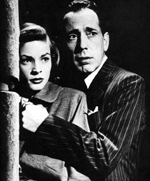Shop Around pt 4 Ö

One of the most striking sections is the lyrics to Joy Divisionís songs. Some of which really work well on paper. One of Ianís later sets of songwords were for 'In A Lonely Place', and you can try to read all sorts of things into them if you know the groupís history. New Order, of course, recorded the song as the flipside of Ceremony, the groupís first outing. It remains the most mournful but austerely wonderful of their records. Although arguably a lost moment, it is readily available on the ever-reduced Substance singles compilation.
Curtis comes across as a bit of a film fan so would have been aware of Nicholas Rayís In A Lonely Place, the magnificent 1950 film noir starring Humphrey Bogart in one of his moodiest and most haunted roles, alongside the lovely Gloria Grahame. You will know she is one of this columnís favourites, the femme noir, the film star who should never have died in Liverpool. Like several of Bogartís finest performances, In A Lonely Place is widely available very cheaply on DVD. Sadly not all of Nicholas Rayís films are so readily available. One I would love to see on sale everywhere is They Live By Night (also a song by the very great Make Up). It was later updated by Robert Altman as Thieves Like Us, which in a strangely natural symmetrical way provided the title for a great New Order song too.
My own favourite Bogart performance is the one he gave in Dark Passage, the video of which I grabbed for a couple of pounds in a charity shop a while back. The basis of the film is the David Goodis book, and it irritates me no end that his books remain so elusive. I read an old battered paperback of his Cassidyís Girl a few weeks ago, and the bleakness of his writing just rips you apart.
At least the Prion paperback edition of Shoot The Piano Player remains in circulation in some of the discount bookstores. I think itís in the Godard film Une Femme Est Une Femme that in an exchange with Anna Karina reference is made both to Goodisí book and Charles Aznavour in the Truffaut film. Actually talking of Godard and Karina, the Make Upís singles collection I Want Some makes an appropriately explicit connection to the French New Wave in the artwork of the accompanying booklet.
Itís still argued that Paul Weller and Mick Talbot bonded over a shared love of jazz, soul, and Ď60s French cinema before forming the Style Council. I have one tip for you all. If youíve not heard their 1985 Our Favourite Shop set for many a year, then treat yourself. I renewed my acquaintance with it as part of a private joke about Milton Keynes, but thatís a different story. What amazed me was how very vital and powerfully polemical it remains. Thatís political in the accepted explicit sense and the very personal intimate way that few ďprotestĒ records ever really manage.
It still sounds like a great pop record, it still has a lot to say, and it contains some of Paul Wellerís most moving moments. I am thinking particularly about 'A Man Of Great Promise', which sets heartbreaking words to an eerily uptight and outtasight soul strain. And, yes, 'Come To Milton Keynes', and the darkness the bright new towns hide. I remember hearing a conversation on the tube (funnily enough the day of Live Aid) between two members of a failed mod group, searching their souls about whether they were allowed to love the Style Council, but acknowledging that ďWe used to chase dreams but now we chase the dragon ÖĒ was a fantastic line. Then the smile on a Jasmine Minkís face when he heard 'Walls Come Tumbling Down' and realised his hero could still bite.
The cover of Our Favourite Shop is of course about accumulating imagery of childhood and inspiration. Like a lot of things the Style Council did itís partly a bit of fun, and partly deadly serious. Itís easy to see how accusations were levelled at them for being too referential and reverential, but it never did Woody Allen any harm. And I was only reminded a few weeks ago of his monologue in Manhattan which made me want desperately to see Swedish films, and 25 years on itís much easier to watch Ingmar Bergmanís films in your living room in a way Woody would hardly have dared hope for.
Just listening again to Mick Talbot singing the Style Councilís 'Homebreakers', I am reminded of his pivotal role in the 2003 renaissance of Dexys Midnight Runners, and the way he directs the group and contributes scarily sweet backing vocals. Maybe itís time to promote the cultural rehabilitation of someone who has been there and thereabouts at a number of important times down the years?
© 2005 John Carney